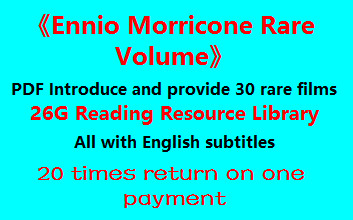| 主页-->songmusic-000-->mus061-065
|
Same
EN |
| |
|
莫里康音乐目录
mus-061 ---> mus-065
|
|
|
|
|
|
|
|
您可以立即得到以下莫里康内爱好者必备资源的所有密码
|
|
1. 莫里康内谱曲的397部电影原声音乐资源(总计
5596 首 总容量2.8G )
|
|
2.本站历年发布过的莫里康内配乐83部最著名电影高码率视频文件
总容量64G
|
|
3.本站琴谱专栏的所有琴谱 (308首莫里康内谱曲的琴谱共计297M提供一次性完整下载)
|
|
|
| |
| |
|
|
|
|
mus-061
Cinema
paradiso / 天堂电影院
|
|
|
|
序号
|
曲名
|
WMA
|
|
001
|
Cinema Paradiso
|
|
|
002
|
Maturity
|
|
|
003
|
While Thinking About Her
Again
|
|
|
004
|
Childhood And Manhood
|
|
|
005
|
Cinema on Fire
|
|
|
006
|
Love Theme
|
|
|
007
|
After the Destruction
|
|
|
008
|
Four Interludes
|
|
|
009
|
Runaway, Search and Return
|
|
|
010
|
Projection for Two
|
|
|
011
|
From American Sex Appeal
To The First Fellini
|
|
|
012
|
Toto And Alfredo
|
|
|
013
|
For Elena
|
|
|
|
|
|
mus-062
guns
for san sebastian / 双虎将大追踪 / 烽火山河 / 一卒将军
|
|
|
|
001
|
overture
|
|
|
002
|
the chase
|
|
|
003
|
the long trek
|
|
|
004
|
love theme (leon leaves kinita)
|
|
|
005
|
music at the governor's dinner
|
|
|
006
|
the white stallion
|
|
|
007
|
love theme (leon tells his
love)
|
|
|
008
|
building the dam
|
|
|
009
|
the attack
|
|
|
010
|
the burning village
|
|
|
011
|
the villagers prepare to
blow up the dam
|
|
|
012
|
teclo's death
|
|
|
013
|
end title
|
|
|
| |
|
mus-063
La
cage aux folles 3
/ 一笼傻鸟3
|
|
|
|
001
|
now it's up to me
|
|
|
002
|
castelli di scozia (ilona's
love)
|
|
|
003
|
tu sei qui per me
|
|
|
004
|
il piacere di piacere
|
|
|
005
|
stasera ti amo
|
|
|
006
|
d'amore si vive
|
|
|
007
|
ask me
|
|
|
008
|
il volo dell'ape regina
|
|
|
009
|
tu sei qui per me
|
|
|
010
|
stasera ti amo
|
|
|
011
|
notturno marino (unhappiness)
|
|
|
012
|
due ragazzi normali
|
|
|
013
|
ask me
|
|
|
| |
|
mus-064
La
monaca di monza /
深院偷情 / 蒙扎的尼姑
|
|
|
|
|
|
001
|
La Monaca di Monza
|
|
|
002
|
La Quinta E In Coma
|
|
|
003
|
notte non notte
|
|
|
004
|
postludio alla terz
|
|
|
005
|
povera sesta
|
|
|
006
|
Preludio Alla Prima
|
|
|
007
|
quel giorno
|
|
|
008
|
requiem per la sett
|
|
|
009
|
svegliarsi pensando
|
|
|
010
|
titoli di coda
|
|
|
011
|
una macabra scopert
|
|
|
| |
|
mus-065
Le
foto proibite di una signora per bene
|
|
|
70-07-official
|
|
相关电影页
|
|
|
备注
|
-official 表示为官方目录.
|
|
|
001
|
Foto Proibite Di Una Signora
Per Bene
|
|
|
002
|
Qui Ci Scappa Il Morto
|
|
|
003
|
Amore Come Dolore
|
|
|
004
|
Bella, Cara, Dolce, Buona
Mogliettina Per Bene
|
|
|
005
|
Allegretto Per Signora
|
|
|
006
|
Nel Vuoto
|
|
|
007
|
Intermezzo Pop
|
|
|
008
|
Caduta Nell'inconscio
|
|
|
009
|
Secondo Intermezzo Pop
|
|
|
010
|
Percussivamente
|
|
|
011
|
Quelle Foto
|
|
|
| |
|
|
|
|
|
您可以立即得到以下莫里康内爱好者必备资源的所有密码
|
|
1.
莫里康内谱曲的397部电影原声音乐资源(总计
5596 首 总容量2.8G )
|
|
2.本站历年发布过的莫里康内配乐83部最著名电影高码率视频文件
总容量64G
|
|
3.本站琴谱专栏的所有琴谱 (308首莫里康内谱曲的琴谱共计297M提供一次性完整下载)
|
|
|
| |
| |
|
|
|
|
|
|
|
| Ennio
Morricone Mini biography:
A classmate of director Sergio Leone with whom he would form one of
the great director/composer partnerships (right up there with Eisenstein
& Prokofiev, Hitchcock & Herrmann, Fellini & Rota), Ennio
Morricone studied at Rome's Santa Cecilia Conservatory, where he specialised
in trumpet. His first film scores were relatively undistinguished,
but he was hired by Leone for Per un pugno di dollari (1964) on the
strength of some of his song arrangements. His score for that film,
with its sparse arrangements, unorthodox instrumentation (bells, electric
guitars, harmonicas, the distinctive twang of the jew's harp) and
memorable tunes, revolutionised the way music would be used in Westerns,
and it is hard to think of a post-Morricone Western score that doesn't
in some way reflect his influence. Although his name will always be
synonymous with the spaghetti Western, Morricone has also contributed
to a huge range of other film genres: comedies, dramas, thrillers,
horror films, romances, art movies, exploitation movies -making him
one of the film world's most versatile artists. He has written nearly
400 film scores, so a brief summary is impossible, but his most memorable
work includes the Leone films, Gillo Pontecorvos _Battaglia di Algeri,
La (1965)_ , Roland Joffé's The Mission (1986), Brian De Palma's The
Untouchables (1987) and Giuseppe Tornatore's Nuovo cinema Paradiso
(1988), plus a rare example of sung opening credits for Pier Paolo
Pasolini's Uccellacci e uccellini (1966). It must be stressed that
he is *not* behind the work of the entirely separate composers Bruno
Nicolai and Nicola Piovani despite allegations made by more than one
supposedly reputable film guide! |
| |
| |






